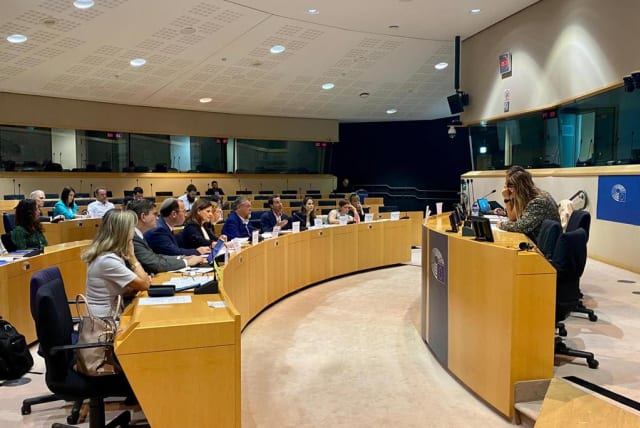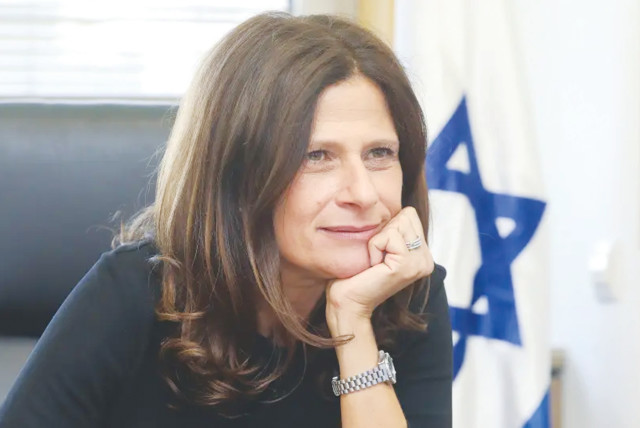Protecting, predicting, and preventing online antisemitism - opinion

Many global initiatives have been launched to combat virulent, rising antisemitism.
Lived experiences of Jews across the globe, corroborated by alarming statistics, indicate there has been an alarming increase in antisemitic incidents. Research conducted and published by technology experts reveal a relationship between antisemitic tropes, memes, and rhetoric combined with online conspiracy theories and the uptick in real world attacks, harm, and violence.
There is an undeniable relationship between the hate spewed online, and the real-world harm and violence that spills onto campuses and into the streets. Online hate is fueled by, and fuels, dangerous propaganda that transcends the geographic borders of any country.
Combating this social contagion spreading hatred globally, requires global collaboration. Alongside the growing challenge, online antisemitism presents an opportunity and responsibility for digital platforms, policy makers, special envoys, technology experts, and civil society stakeholders to work together to recognize, track, and examine the rising threat to foundations of democracies, and to create comprehensive recommendations, strategies, legislation, and mechanisms that can inform and be utilized in the broader context of combating antisemitism and in addressing forms of online hate, conspiracy, and disinformation.
Many global initiatives have been launched to combat virulent, rising antisemitism. One such initiative grew from parliamentary hearings held in Israel’s 23rd Knesset, in which social media giants, civil society organizations, and technology experts convened to better understand the alarming rise in viral online antisemitism that coincided with the COVID-19 pandemic. Subsequently, the Inter-parliamentary Task Force to Combat Online antisemitism was launched in 2020, together with multiple partisan members from the US, Canada, UK, and Australia.
The Task Force's actions
The Task Force has since grown to include additional multiple partisan members from across the globe, creating a continuum in discussion and aiming to serve as a consistent voice committed to protecting all from online hate. Critically transcending real and perceived differences – of geography, politics, religion, language, and more – the Task Force works to establish consistent messaging and policy from Parliaments and legislatures around the world to hold social media platforms, including Twitter, TikTok, Facebook, and Google, accountable; to advocate for the adoption and publication of transparent policies related to hate speech and ensure their consistent application; to raise awareness about antisemitism on social media platforms and its real-world consequences in order to acknowledge the tremendous responsibility that comes with the power these platforms hold; and to emphasize that if one minority cannot be protected by hate speech policies and their detailed protected characteristics, ultimately none can.

The Task Force’s 2021 Interim Report included several key recommendations, repeated in the 2022 September hearings held in the US Congress. These included the acknowledgement that in order to effectively and comprehensively identify and combat online antisemitism, it is critical to define it. Further, we have repeatedly underscored the imperative for social media platforms to enhance transparency regarding algorithms, policies and their implementation – including how content is removed, what content is removed, and what tools are used to direct users to certain sites or redirect users away from hate and/or harms and provide regular quarterly reports on these issues. This is critical if platforms are to indeed be a marketplace of ideas, not of eyeballs, in which individuals are directed to content that reinforces existing opinions. The clear conclusion is that legislators too must take responsibility, demanding or creating independent oversight mechanisms to efficiently and transparently monitor the online space. The most recent hearings held in the European Parliament were frustratingly repetitive of those in Congress. Identical questions posed by members nearly a year later received inadequate if any response or indication that there has been any change.
More than ever, this hearing underscored imperative for the international consensus definition, established after nearly 20 years of democratic process and adopted by 41 countries and over 1,000 entities – the International Holocaust Remembrance Alliance (IHRA) working definition – be used as the benchmark definition of antisemitism for social media giants to turn to as well.
This comprehensive working definition critically enables, as Canada’s former justice minister and current Antisemitism Envoy Prof. Irwin Cotler explained, to track the mutation from its “traditional” form, barring the individual Jew from an equal place in society, to the mainstreamed, “modern” form, barring the Jewish nation state from an equal place among the nations.
The late Elie Wiesel underscored that the Holocaust did not begin in gas chambers, it began with words. The hate being spewed online today against the Jewish people and their sovereign state must be of significant concern.
The platforms have taken some steps forward since the founding of the Task Force in 2020, developing new tools that can support our efforts to combat online antisemitism and hatred. For instance, Facebook committed to flag Holocaust denial and refer users to a WJC website with educational resources on the Holocaust. Twitter enabled users to add context to misleading Tweets, again creating an educational moment without limiting free speech.
Knowing this is possible, these same tools should be utilized and expanded to include flagging antisemitic posts and/or tweets and referring out to the IHRA definition of antisemitism. Like Twitter’s added context, a label at the bottom of the tweet could be added to say “warning, this is a violation of the IHRA definition of antisemitism. Learn more at www.holocaustremembrance.com.” In this way, speech is not limited of curbed, rather something is being done to address the online antisemitism in our midst.
The continued Task Force discussions held in the US Congress and EU Parliament recognize that we have a shared responsibility to work together, learning from one-another in order to identify and combat the mutating hate in our midst and to put a stop to the downward spiral of antisemitic vitriol.
The imperative to raise the public’s awareness to the dissemination of hateful digital information and to the fact that we are not consumers in the current digital platform business model, but rather the product, assumes and reclaims compromised free will and agency, at a time of supposed ultimate freedom and agency. The Digital Safety Act (DSA) recently passed in the European Parliament paves the path globally for the transparency critical for all of our societies and for social media platforms to be held to account.
These hearings and the continued work of the task force together with so many partners are not about blame. They are a call to action – to legislators, tech giants and experts, special envoys, civil society, and the general public – to engage and hone the ability and responsibility of our generation, namely to ensure that as humanity continues to evolve and develop, we devise necessary tools to address the fundamental changes in the way we consume information, while ensuring that the spread of virulent hate and conspiracy theories, of which antisemitism is a predictive example, does not collapse the entire shared infrastructure, taking us back to the darkest times in history.
They underscore the imperative to acknowledge that dehumanization, delegitimization and double standards (Sharansky’s 3D’s) are – once again – the mechanism that enable the toxic mutation of antisemitism. They sound the alarm for all who cherish life and liberty to demand that social media giants be held to account, acting on their responsibility to protect, honing their ability to predict, and realizing their imperative to Prevent.
The writer is a lawyer, research fellow and policy and strategy adviser. She served as a member of Israel’s 23rd Knesset, cofounding the Inter-Parliamentary Task Force to Combat Online Antisemitism.
